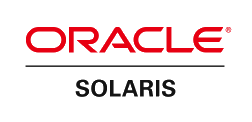Oracle Solaris
 |
|
| Developer | Sun Microsystems (acquired by Oracle Corporation in 2009) |
|---|---|
| Written in | C, C++ |
| OS family | Unix (System V Release 4) |
| Working state | Current |
| Source model | Mixed open-source / closed-source |
| Initial release | June 1992 |
| Latest release | 11.3 / October 26, 2015 |
| Marketing target | Workstation, server |
| Platforms | SPARC, x86-64, IA-32 (except Solaris 11), PowerPC (Solaris 2.5.1 only) |
| Kernel type | Monolithic with dynamically loadable modules |
| Default user interface | GNOME |
| License | Various |
| Official website | www |
Solaris is a Unix operating system originally developed by Sun Microsystems. It superseded their earlier SunOS in 1993. In 2010, after the Sun acquisition by Oracle, it was renamed Oracle Solaris.
Solaris is known for its scalability, especially on SPARC systems, and for originating many innovative features such as DTrace, ZFS and Time Slider. Solaris supports SPARC and x86-64 workstations and servers from Oracle and other vendors. Solaris is registered as compliant with the Single UNIX Specification.
Historically, Solaris was developed as proprietary software. In June 2005, Sun Microsystems released most of the codebase under the CDDL license, and founded the OpenSolaris open-source project. With OpenSolaris, Sun wanted to build a developer and user community around the software. After the acquisition of Sun Microsystems in January 2010, Oracle decided to discontinue the OpenSolaris distribution and the development model. In August 2010, Oracle discontinued providing public updates to the source code of the Solaris kernel, effectively turning Solaris 11 back into a closed source proprietary operating system. Following that, in 2011 the Solaris 11 kernel source code leaked to BitTorrent. However, through the Oracle Technology Network (OTN), industry partners can still gain access to the in-development Solaris source code. Source code for the open source components of Solaris 11 is available for download from Oracle.
...
Wikipedia
